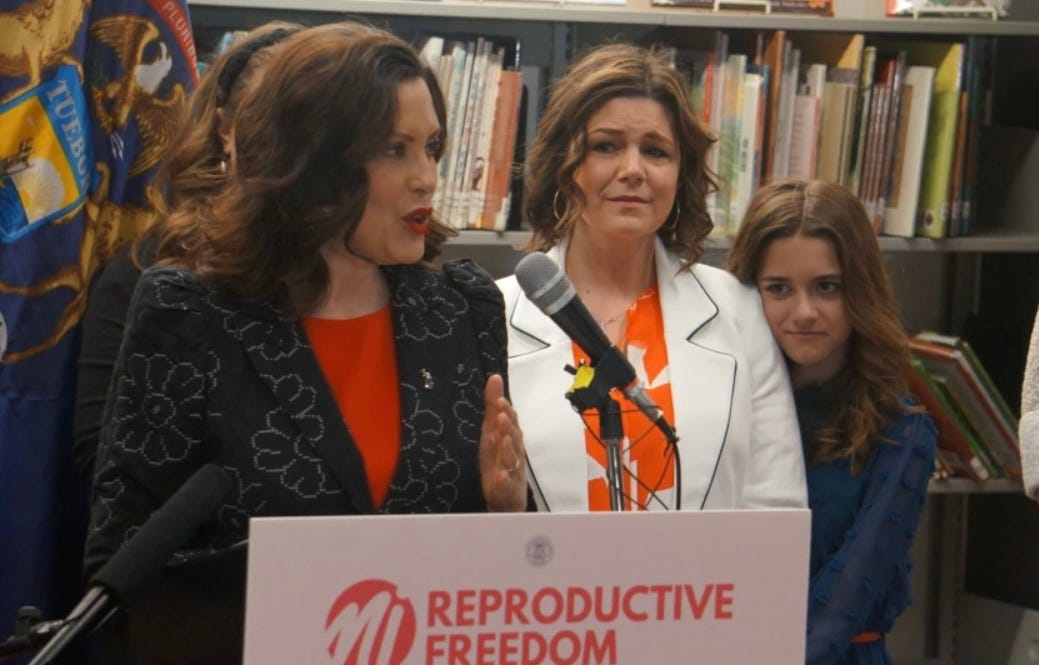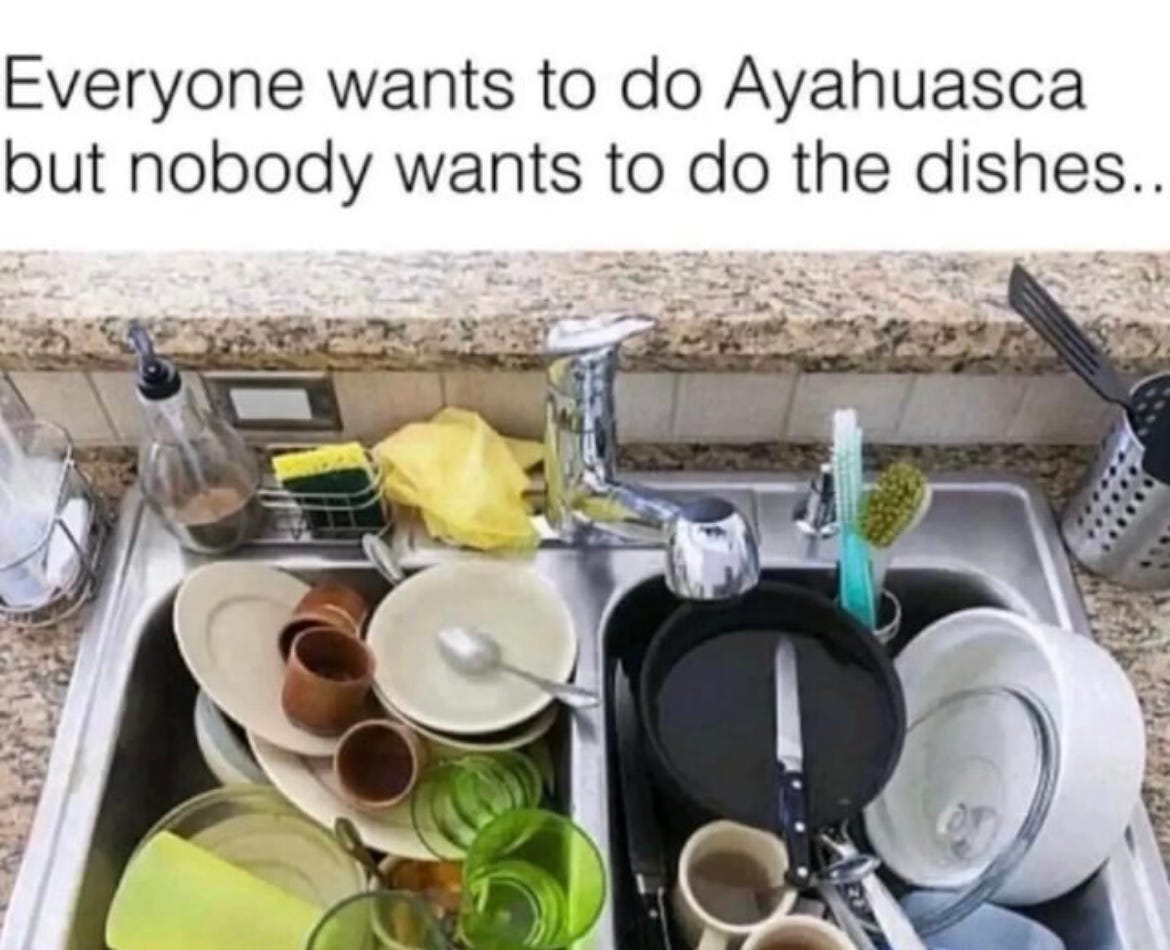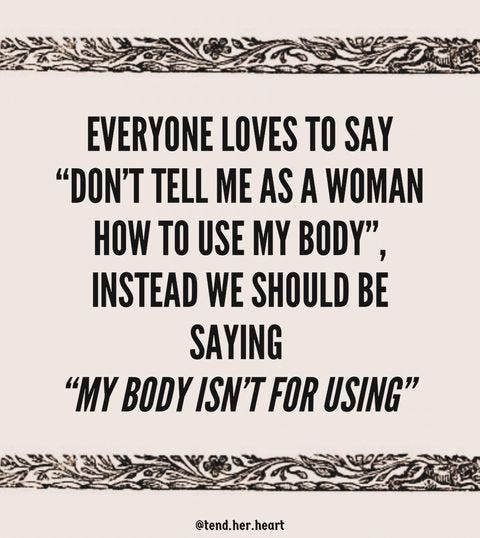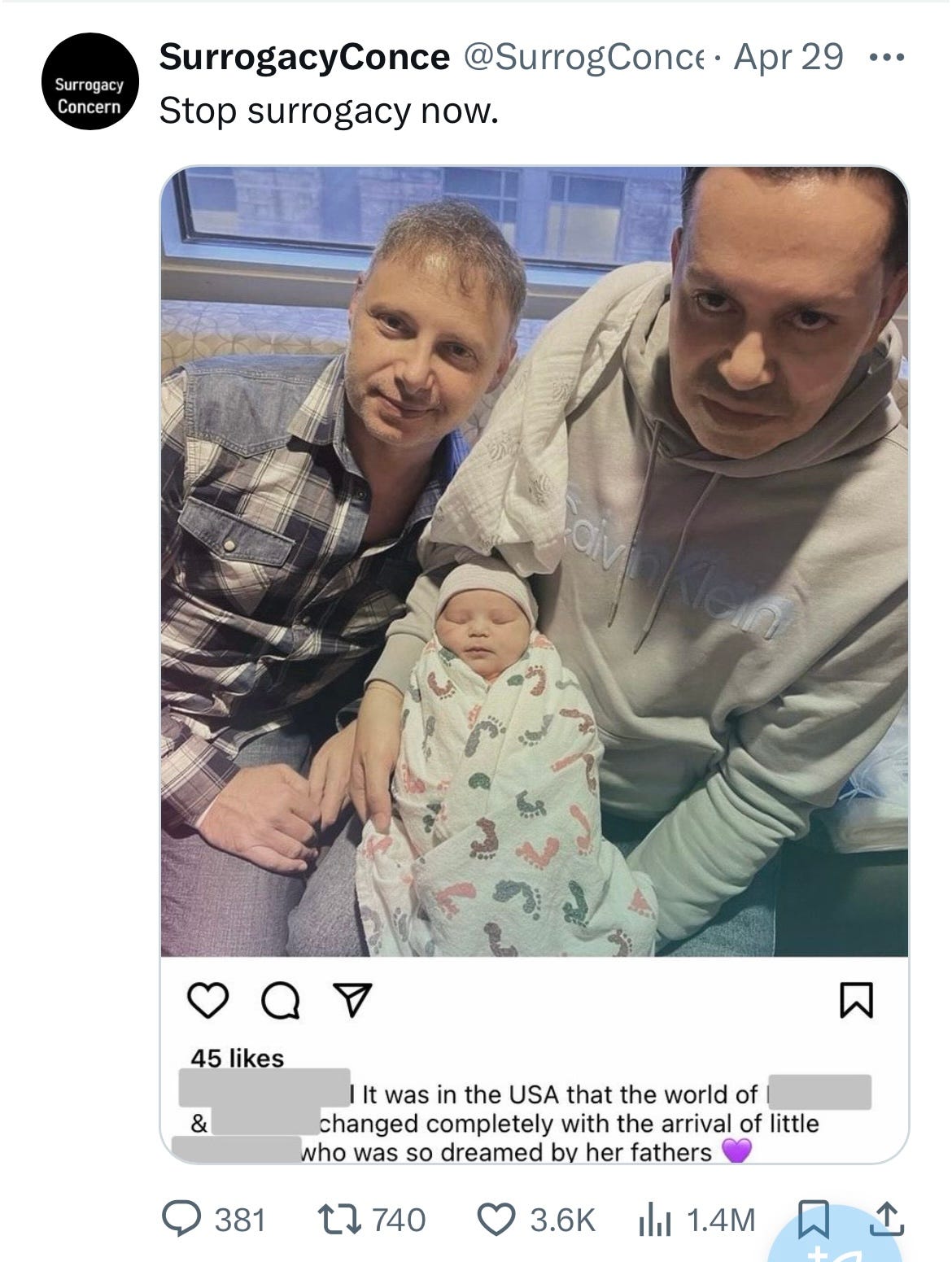Materialism vs. the Material of Life
The feminine urge shall not be corporatized-aka I’m mad about surrogacy again
Just over a year ago I started this Substack on a whim by fleshing out a single impassioned Instagram comment raging against surrogacy. Here I am, a year later, still mad and hopefully slightly more articulate. Thank you for being here, I truly appreciate you all.

Have you seen that meme “Everyone wants to do ayahuasca, no one wants to do the dishes”….?
It’s funny and poignant because it subtlety points out what we all know but maybe all don’t admit- it is easy to go for the dramatic quick fix to your problems, it’s not so glamorous to just do the basic daily work of tending to them so they mend slowly and steadily over time. In the same sense, everyone loves to say “don’t tell me, as a woman, how to use my body”, no one seems to want to say my body isn’t for using.
Just like doing the dishes is tedious and time consuming, so too is the mental effort it takes to come back to a true understanding of the relationship between the female body and economy.
I’m referring to the effortlessness of proclaiming wide, insistent, easy generalizations that are repeated to us in many forms over many years (“my body my choice”, “sex work is work”, etc). It’s not so effortless to stare in the face the reality which we are up against. Taking the jungle drug to fix our broken brains is strangely similar to imbibing the drug of collective illusion by-way-of-adage-parroting to trick our animal brains into fitting into current socio-political conditions. I posit that we need to do the proverbial dishes instead.
My reasoning for this suggestion has a lot to do with my daughters. We are all rightfully fearful of our girls seeing unhealthy beauty standards on the internet, of them seeing abusive acts in porn, of them being exposed to pro-eating disorder content. What I protest in equal measure, and what I do not hear discussed at all, is the possibility of my daughters being indoctrinated via the language of feminine inversion, the language which speaks to women as if its purpose is to empower but whose purpose really is to domesticate and subdue. An example, taken from a post about surrogacy, and written by an influencer who is apparently quite popular who I shall not name:
“US WOMEN are in control of OUR bodies - let US decide what we want to do! If we want to do porn, let us do porn, if we want to prostitute, let us prostitute, if we want to be a surrogate mother, let us be a surrogate mother..... LET US BE WHAT WE WANT! Nobody can dictate what we should or shouldn’t do”
Ladies and gentleman, the words of total blind assent. The words of a woman convinced of her own disvaluation and object status. The words echoed by a large portion of women, words which prey upon certain qualities of general feminine nature and which turn them into means to broken ends. I don’t want this language of self-objectification to meet my daughters’ ears. This is the language of the inorganic, that which alchemizes the human animal into the corporate object of desire and profit. Consider the fact that 2% of all American women are now selling their souls on OnlyFans. Corporate forces are preying on gutter-level human instincts and we are just letting them do it.
A popular battle cry of the modern liberal feminist woman is “don’t tell me how to use my body”.
To use means to take, to consume-which implies the user is a consumer, which is exactly what things like “sex work” and surrogacy accomplish. It is a transaction of a consumable product. To be used is to be a product. We are not products. Yes, of course we have the capability and right to use our own bodies as vehicles for accomplishment, locomotion, pleasure, creation. The “use” debated here is not of the same nature however, this is the use of the body as a product in and of itself.
Maybe instead of using our bodies, we could discuss a more interdependent understanding of the female body-that is, the fact that this body is in relationship with all the other parts of ourselves-heart, mind, soul and spirit. We could discuss the reciprocal relationship between ourselves as whole beings with the people who know and enjoy and commune with our bodies-not use them. We could recognize that any entity or individual that seeks to purposefully ignore this interdependence is an agent of chaos and oppression (the real kind, not the fake kind people with made-up job titles and nature deniers like to whine about).
A sex buyer or a baby buyer is not in a reciprocal relationship with the whole female being. They are a consumer of a raw product they pay to get access to. They are the epitome of reductive consumerism. The industries they support view the female body as mere human capital and the baby as the profit cash cow-it’s depraved economics. When we shift from the good being the labor of humans to the humans themselves, we shift from the realm of economics to a sort of veneration of bondage of the human body, and along with it, the human spirit.
Consider a dress. It is made of effort, of thought and design and skill. It requires time and consideration. One part cannot exist without the other, the seams attach equally essential sections to create the whole. The material the dress is made from is vastly less valuable than the dress itself, due to the input that material needs to become a useful and beautiful creation. We, as women, are not mere material, we are the entire garment. As such-we are valuable, but often not truly valued in our culture. We must move toward a notion of inherent feminine value-both as females and as a society and nation. It isn’t enough to be material or garment, we must be recognized as valued souls which express and experience the material of life.
This is the fabric from which human experience is cyclically fashioned. Sex. Conception. Pregnancy. Birth. Nursing. Parenthood and Childhood (Motherhood and Girlhood). Illness and Healing. Growth and Aging. Death.
The human person is not made to be parted out like a junkyard Buick. The effort and skill and consideration that culminates in our design makes us whole. We live in a materialistic society that makes the reduction of people into parts mentally easy yet we cannot acquiesce to this subverted version of normality. In the rich woven heritage-tapestry of humanity, the materials are abundant and assorted, and they are not be trivialized and exchanged without courtesy.
It is not ethical or right to pay for the experiences that fall into “the material of life” like sex or birth or parenthood. Bought affection is false and the falsehood is a lie that is self-limiting to humanity. You shouldn’t be able to pay your way into relevance, it’s akin to rape or murder, which we universally see as an affront to nature. There is a reason why certain things are taboo. Why do we not see sex buying or surrogacy the same way?
The raping of the human spirit, by way of stripping us from relational production and trade, and instead, focusing solely on production at all costs, is a method of de-vitalization, and it is a weapon. Between turning our bodies into props and taking away the interpersonal aspect of conducting business-we are stripping ourselves of uniquely human existence. These examples are the extreme ones, but these energetics are at play in many industries, from healthcare to agriculture.
The subtraction of healthy emotion and symbiotic give and take from industry by way of increasingly global and virtual interaction versus local and communal interaction means it is all the more easeful to see other people as a means to our own ends, and surrogacy is a perfect example of this unfortunate phenomenon.
I was inspired to write on this topic again after a wild couple of weeks of surrogacy-related internet swill was presented to me courtesy of le algorithm. A sampling to fan your inner rage flames:
The above image is circulating online-of a male hair stylist who used a surrogate to carry twins laying in a hospital bed (why any hospital accommodates this nonsense, whether they have space or not, is beyond any worldly understanding) as a no-doubt very distraught and confused screaming baby is laid to rest on his hairy chest. There is another video of him wheeling around in the surrogate’s wheelchair in the hospital halls, clearly amused and clearly out of touch with the reality of her experience.
Kholé Kardashian pictured (again-in an unnecessary hospital bed!) with her surrogate-born son Tatum. She stated in an interview, about the weekend her surrogate was induced, that “Dr. A called, and she said she just had a checkup with my surrogate, and she said: ‘Khloé, we have to deliver within 24 hours,'” she recalled. “The baby wasn’t due for, like, another week or two, and this was my last weekend with my daughter, True. Like, in my head, I just needed the weekend.” So I go: ‘No, we can’t do this,’” Khloé added. “And she’s like: ‘No, there’s fluid in the sack, we need to do this.’ I go: ‘I’m having a weekend with True!’ And she goes — this is the Mother Teresa — I started hysterically crying because it wasn’t even about the weekend, it was about now this is real. And she goes: ‘You know what, I’ll deliver the baby, I’ll take the baby, and you come let me know when you’re ready to pick him up’”. I actually appreciate her candidness here because it truly speaks to how this practice is inherently so disembodied and disconnected.
And then there was this photo, also being widely circulated on social media. Honestly,I know people will say pushing back against this is homophobic, and will cry "judgmental" when commenting on the appearance of these men-but when did we lose the understanding that being able to discern via our senses-including vision-is a gift? Any rational, normal person can look at that man and judge reality, and the reality is that he cannot possibly hold any sort of good intentions, and it is right and good to make that sort of judgement! No sense is being utilized here and our laws are absolutely putting innocent lives at risk in favor of economic gain and social gain-especially when surrogacy becomes a tourism draw.

Also, in slightly older news, Michigan Governor Gretchen Whitmer recently signed legislation repealing the state’s criminal ban on surrogacy, and in doing so legalized surrogacy contracts and compensated surrogacy. Michigan was the last hold out on criminalizing surrogacy, which, after their past involving the heartbreaking case of “Baby M” (whose mother MaryBeth Whitehead was a traditional surrogate, therefore she was biologically, not just “gestationally”, the child’s mother) makes sense.
Seeing this news didn’t shock me but it made me pause. It’s just another step to completely normalizing a practice that is extremely ethically messy. It’s a step towards fully legitimizing an industry that shouldn’t be legitimized. It made me consider the fact that children who are growing up now in communities where surrogacy seems normal will grow up and not even think to question it at all. And it should be questioned, at the bare minimum.
Many people like to rely on the idea that surrogates are simply just virtuous women who love being pregnant. The issue with this assessment of the situation is twofold. First, it completely ignores the implications of the situation that the resulting baby will have to weather. Secondly, it implies an allowance for the taking advantage of female instincts. This idea that a woman who enjoys being pregnant should then obviously rightfully be able to sell her ability to get pregnant and that others should rightfully be able to rent her for this purpose is a predation on inherently and distinctly female urges. And I propose that the feminine urge should not be corporatized!
Is this any different than saying “well if a woman likes sex then she should be able to sell sex and others have the the right to buy it from her?”. Our feminine urges to copulate and experience orgasm should not be an economical currency, for individual or industry, and neither should our wombs’ reproductive capacity. Many will argue that these are the oldest trades in the book, that our female bodies have always been for sale, and I’m sure this is true.
And yet-is the sale of the womb good and right? I’m only concerned with that is good and right. Not only this, but I’m only concerned with a state of things that doesn’t leave financially and mentally/emotionally desperate women more vulnerable than they already are. I have been a desperate woman and I know what desperate women do. I would like the options, in those circumstances, to be limited.
Our urge to carry babies in our wombs, our propensity for kindness and generosity, our general self-appointed opting into care work-these stereotypically feminine qualities are the foundation on which surrogacy agencies sit. All of the doctors, recruiters, lawyers and social workers involved are lining their pockets with the goodwill and trust of women. The fact that women make up the vast majority of the “care economy” speaks for itself. We can both wax poetic about the inherent care taking capabilities of women and argue over whether these are truly inherent and discuss all of the exceptions til the cows come home, but both the data and common sense inform us of the fact that there is a certain self-selection into care work, whether paid or not, on behalf of the female half of the population. Is surrogacy care work though? Is prostitution? I do not think so but I do think many people, those of broken morals and injured instincts, would say they are.
In saying so, the people who support surrogacy and work in the industry are equating technologically complicated bodily rental and human production with getting our basic needs met (like childcare and elder care). This isn’t the same. The calculated production of humans is not care for humans. When both the good and the capital is human, “care” is not present any longer. This is an industry that is predicted to grow to around USD 61.45 Billion by 2030, and some of that growth will be due to the surrogates themselves, who can recruit other women to join with their agencies as a part of referral programs. It’s like your friend’s annoying MLM scam only she wants your uterus so she can get her double-diamond bonus check.
Just Google “surrogate referral program” and it becomes patently clear that this industry is using women to reel in their fellow women, as you can see in the above screenshot. What does this remind me of? Oh yes, OnlyFans, again. They too run a referral program for women to monetize their relationships with and the bodies of other women. The parallels are paralleling, as the kids would say.
Let’s take into consideration a very popular “surrogacy influencer”, Samantha Mathews. She has half a million followers on IG, 370k+ on YouTube, and is pushing 800k on TikTok. She is currently documenting her second “journey” and she has a story highlight that is called “Be a Surro!” that links directly to her agency Your Fertility Advocate, where her image is used in the graphics.
I cannot claim to know what sort of compensation this woman is receiving for making her social media profiles into a walking, talking, never-ending ad for surrogacy (and egg donation-which she has not partook in but which she also has links for so other women can). I can imagine with the numbers she has on multiple platforms, she is doing just fine.
This case, of a woman making a living off of not only surrogacy itself, but of recruiting other women-of being a literal surrogacy influencer-taps into perhaps the shadow urges of the human female. The part of us that craves attention and praise. The part of us that is prone to greed. The part of us that whispers lies to ourselves in order to validate. The part of us that wants to appear to be “nice” while actually being very calculated on the back end of things. Most of us have these “shadow” qualities and just as our true kindness and generosity and penchant for fecundity should not be corporatized, neither then should our more hidden and less palatable feminine inclinations.
As you can see in the above photo of Samantha, the ads for and wording on surrogacy agency websites use the concept of feminine kindness and generosity as a beckon to all women of childbearing age. However, kindness does not live where human women are placed in catalogs to be bought and sold. We are not categorizable in the way a catalog implies, and we should not be encouraging other women to allow themselves to be, much less perusing the catalogs ourselves or baiting other women into the industry so we can take a cut. We are not items in a systematic list of consumables.
The following Ivan Illich quote aptly comes to mind:
“Societies in which most people depend for most of their goods and services on the personal whim, kindness, or skill of another are called underdeveloped, while those in which living has been transformed into a process of ordering from an all-encompassing store catalogue are called advanced”
In any other context, listing women in such a way would be called all the “ists”-racist, ableist, sexist even (we all know no one is paying a “trans woman” to be their surrogate-how sexist of them!). It seems that it is only when a great deal of money is being exchanged that it is okay for people to express certain preferences, because their financial and class advantage allows them the luxury of categorizing other humans in such a simplistic way.
The material of life must be earned via merit and virtue, and should we come to cross with hardship in these vital travels, we must bear them with grace. Those who choose to force their way into possession of this material lack that grace. Intended parents could be compared to incels in this way, as they may not be involuntarily celibate but they are typically involuntarily infertile. Their use of surrogacy implies they feel they have an innate right to the use of another human’s body-the same way many of the men in the incel community feel the right to sex with women much more beautiful than they. This comparison may feel cruel, but it is truths like this that inspire the sort of changing of minds we need on these issues.
We all have certain crosses to bear-certain realities about our bodies, experiences, preferences and/or personalities that we must learn to deal with. I think our inability to deal with the life cards we have been dealt and our penchant for “hacking”these issues and bypassing them altogether with technology speaks to a cultural problem with the concept of acceptance. It is akin to children who don’t know how to behave well when told “no”. It is how we choose to bear these realities that matters. When dealing with fertility issues, the answer is not the conscious and careful choice to use financial means and power to utilize another human being to grant your personal wish. A wish that involves them risking their life and potentially abandoning their own children and partner. A wish that simultaneously produces a new life that will be eternally wounded by their manufactured beginnings.
In all matters of the body, we must be accepting and have humility. In all matters of the female body being human capital, we must be discerning and critical. In all matters of the “feminine urge”, we must be graceful and full of temperance. And in all matters of life-giving and life-receiving, we must be impeccable.














How dare baby Tatum arrive in the world "like, 1 or 2 weeks before the due date" when Khloe had, like, other plans! Gosh, is he going to inconvenience her like this for the next 18 years?! I guess we just say the selfish parts out loud now...
Heart-wrenching stuff. Thank you for exposing the underbelly of these industries.
Just like all your amazing work, this piece left me feeling such a conflicting mix of emotions - heartbroken by where we are right now, yet empowered with a feminine rage. As a mama to my eighteen month old daughter, I have never felt more connected to my body and womanhood since pregnancy and her birth. After years of denying and resenting my femininity, I now fiercely want to defend not just my own, but every female. I can't bear the thought of my daughter growing up with these messages. How can I ensure she remains connected to herself, her body, her soul? The answer still eludes me as I continue to navigate this journey for myself. Thank you for putting into words what I, and I think many women today, struggle to articulate, and for giving so much to reflect on.